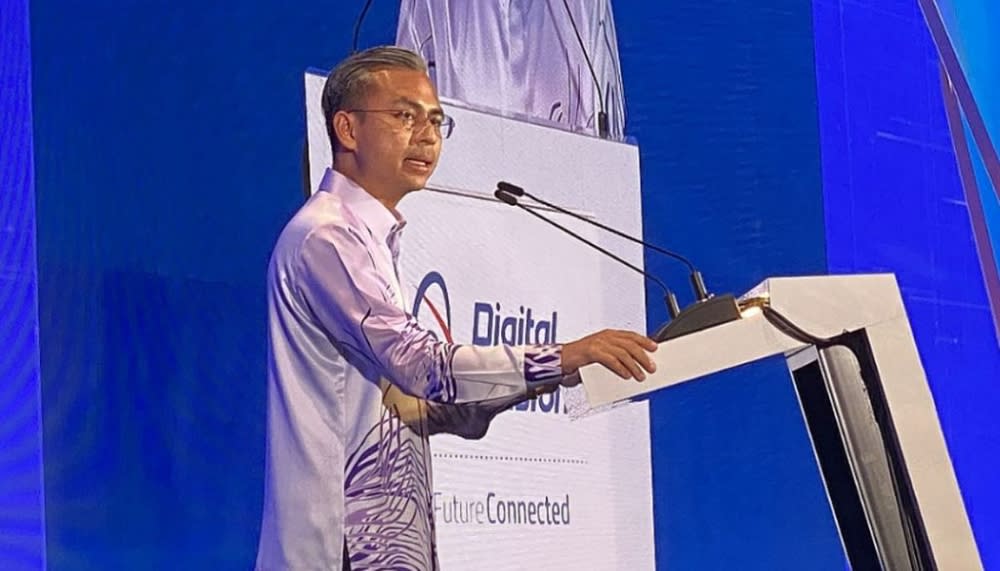Fahmi claims DNB’s 5G rollout is fully funded by Malaysian taxpayers, is this true?

DECEMBER 18 — Communications Minister Fahmi Fadzil has doubled down on calls to telcos to waive extra fees for 5G access. During an event today, he told reporters that the government is considering taking action against telcos that charge existing subscribers additional fees for accessing Digital Nasional Berhad’s (DNB) 5G network. He said there shouldn’t be any additional charges as the entire 5G infrastructure project was borne out of public funds.
Fahmi said entire 5G infrastructure cost was funded by public money
As quoted by Bernama, Fahmi said “It’s essential to note that the entire infrastructure cost, up to the point of signing the share subscription agreement (SSA), was funded by the public’s money.”
“Therefore, there should not be any extra fees. If they continue to impose such charges, we will have to consider taking action,” he added.
The Minister also mentioned that he had a conversation with CelcomDigi CEO, and the newly merged telco will be doing away with the extra fees with their new packages.
DNB and MOF insisted on no govt funding for 5G rollout
The Communications Minister’s remarks come as a surprise as Digital National Berhad which is a Special Purpose Vehicle wholly owned by the Ministry of Finance has repeatedly insisted that there’s no government funding or guarantees that are anticipated or expected, other than the initial RM500 million by MOF as a start-up investment.
DNB was established as a 5G Single Wholesale Network in early 2021 and it appointed Ericsson as its main telecommunications vendor. UOB Malaysia provided RM800 million in financing in October 2021 to enable Ericsson to deliver its first phase of the 5G rollout. Meanwhile, DNB secured RM400 million from Deutsche Bank Malaysia for working capital on daily operations and capital expenditure in November 2021.
Former Finance Minister Tengku Zafrul shared on Facebook in December 2021 that the cost of 5G deployment will be financed through a combination of deferred financing to vendors, trade financing and working capital as well as issuance of Sukuk. He added that DNB will obtain financing through financial services such as banks and it will be repaid through sales generated from 5G wholesale capacity to the telcos.
In a response to former Bangi MP Dr Ong Kian Ming in February 2022, former DNB CEO Ralph Marshall said DNB is committed to rolling out the 5G network and infrastructure at a cost of RM16.5 billion over 10 years, with no government funding or guarantees. The Government will only inject up to RM500 million as equity to capitalise DNB.
When Fahmi was still an opposition MP in March 2022, he asked the government whether public funds had been given, directly or indirectly to DNB since last year and how much have they spent. In a written reply to Fahmi, the Finance Ministry said the government will not be involved in providing any guarantees or funding to DNB. It clarified that the loans will be repaid after the company receives income from its wholesale access and they have spent RM544 million as costs for network infrastructure, network hardware and working capital. At the time, DNB had secured RM1.7 billion in funding from various sources.
Back in October 2022, DNB wrote to us to clarify that the government’s mention of RM1.3 billion investment for DNB during the Budget 2023 tabling is merely an initiative announcement and there’s no allocation from the government. DNB confirmed to us that the 5G rollout will be funded via private-sector financing with no budgetary allocation by the government. The single wholesale network further clarified that they have not received any allocation under Budget 2022 and they have also not received any allocation under Budget 2023.
5 telcos to take 70 per cent stake in DNB, second 5G network to be determined soon
Early this month, five telcos namely CelcomDigi, Maxis, U Mobile, Telekom Malaysia and YTL Communications executed their SSA to collectively acquire a 70 per cent stake in DNB. Each telco will inject RM233 million into DNB for a 14 per cent stake in the 5G network. Meanwhile, the government will retain a 30 per cent stake and a golden share.
Fahmi recently shared that DNB has achieved 76 per cent 5G population coverage as of the end of November 2023. Once DNB achieves its mandated 80 per cent 5G population target by the end of this year, the government will decide on the establishment of the second 5G network which will be led by the private sector. — SoyaCincau



